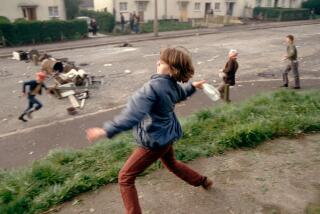Blasts, Briefcases and Stiff Upper Lips
- Share via
Recently my young son’s school wisely canceled a field trip to the local post office that had been arranged before Sept. 11 and the anthrax scare. Only then did I fully grasp how my life is changing in tiny particulars, like hesitating to open my mail and avoiding the post office. I thought: Hold on, I’ve been here before.
Specifically, in England, where for 20 years I lived cheek by jowl, in the center of London, with calculated political terrorism committed by the Irish Republican Army. Central London was a focus of the IRA’s premeditated bombing operation to kill civilians and create chaos. Twice I was blown out of my bed by package bombs planted on or near Oxford Street, where I lived. Once, while strolling near Marble Arch, I was knocked sideways by a parcel bomb planted on the doorstep of a bar. And once, in Piccadilly Circus, a piece of iron shrapnel from a stick of exploding Semtex inserted into a mailbox nearly tore my head off. Nothing personal, mind.
Naturally, I was curious as to why zealots who hadn’t even met me, and some of whose aims I sympathized with, were trying to kill me. Notebook in hand, I wandered around certain Irish neighborhoods in London, chatting with the locals and pub regulars. Almost universally the response I got, from housewives and laborers and office workers, was conflicting.”Oh those poor people who got hurt,” seemed heartfelt and sincere. I replied that I was one of those people who nearly got killed, and that I had helped the ambulance men carry a bleeding victim out of a wrecked store. “Ah well,” would come the response, “it’s a war, like. Y’know, casualties. ‘The boys’ are fighting for a free and united Ireland. People bound to get hurt.” The boys, of course, were the IRA.
If it is political or ideological, I learned, it is not really murder, just a byproduct of centuries of oppression.
I also learned how to live normally under terror. Lots of my British friends had endured and survived World War II, including the Luftwaffe’s air raids. And now the IRA was making more ripped bodies and spattered brains. So you took proper precautions, didn’t lose either your nerve or sense of humor and, as an assertion of (admittedly low-key) defiance, quietly went on with your life.
We’d be sitting around a pub on Charlotte Street after work. Somebody would notice a briefcase unattended under a table. Minutes would tick by. Nobody panicked. Someone might yawn and mutter, “Hmmm, see that thingamajig over there?”
Long pause, and we’d go back to our drinks. Maybe 10 minutes would pass like this. Another person would glance at the lonely briefcase. “Call the police then?” The reply might be: “Oh I don’t know; mustn’t get hysterical about these things.”
“Mmmm.” The English would rather die than create a scene. Finally, somebody in the crowd would slip away and dial 999 (emergency). The bomb squad would appear, evacuate the pub and we’d all stand around on the sidewalk a bit embarrassed by the fuss. Or else discreetly amble home so as not to get caught in the blast.
I don’t recommend such sang-froid. But coolness does have a certain virtue in limiting the spores of panic.
True, excessive patience can be irritating, not to say infuriating or even counterproductive. And I’ve never been sure if such poise is authentic or comes from seeing too many early Alfred Hitchcock movies such as “The Lady Vanishes.” It’s what the English have come to expect of themselves under fire.
We Americans respond more spontaneously. But I wonder if it might not be appropriate to borrow a page from the Israelis, who have been living with sudden death and terror for so long, or from the citizens of Medellin and Bogota or from the Londoners who have survived so much pain with so much understated courage.
Understatement has its limits. But also its glories.
More to Read
Sign up for Essential California
The most important California stories and recommendations in your inbox every morning.
You may occasionally receive promotional content from the Los Angeles Times.













